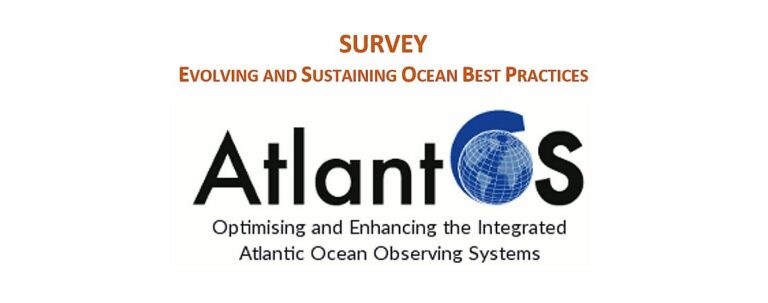AtlantOS* is running a survey on “Evolving and Sustaining Ocean Best Practices”. The Ocean Best Practices System (OBPS) was created to improve access to best practices. AtlantOS is looking for your thoughts on the use of these best practices in ocean observing and also guiding the evolution of the OBPS. Have a look at the survey!
Best practices are a common approach to further consistency in ocean data and information. The definition for an Ocean Best Practice is:
“A methodology that repeatedly produces superior results relative to other methodologies with the same objective; to be fully elevated to a best practice, a promising method will have been adopted and employed by multiple organizations”.
Best practices may come in many forms such as “standard operating procedures,” manuals or guides. The Ocean Best Practices System (OBPS) brings together documentation for technological solutions and community practices (see Pearlman et al, 2019, https://doi.org/10.3389/fmars.2019.00277). The UNESCO International Data and Information Exchange (IODE) is now hosting the OBPS including its repository of best practices.
This survey is being done in preparation for the OceanObs19 meeting in September 2019, Honolulu, Hawaii. USA. The survey should take approximately 10-12 minutes to complete. Please use the link: https://www.surveymonkey.com/r/OBPS-Survey to take the survey. If you have any questions, please contact Jay Pearlman (jay.pearlman@ieee.org).
* AtlantOS is a European H2020 project whose overarching objective is to achieve a transition from a loosely-coordinated set of existing ocean observing activities producing fragmented, often monodisciplinary data, to a sustainable, efficient, and fit-for-purpose Integrated Atlantic Ocean Observing System (IAOOS). This will be achieved through research and innovation activities focused on: defining requirements and systems design, improving the readiness of observing networks and data systems, engaging stakeholders around the Atlantic, as well as strengthening Europe’s contribution to the Global Ocean Observing System (GOOS), a major component of the Group on Earth Observations (GEO), its Global Earth Observation System of Systems (GEOSS), and specifically on its emerging “Oceans and Society: Blue Planet” initiative. AtlantOS contributes to blue growth by merging new information needs relevant to key sectors such as transport, tourism, fisheries, marine biotech, resource extraction and energy with existing requirements. AtlantOS significantly contributes to trans-Atlantic cooperation by integrating existing observing activities established by European, North and South American, and African countries and by filling existing gaps to reach an agile, flexible IAOOS and associated ocean information systems around the Atlantic.
Learn more about AtlantOS and its eleven top-level objectives here.

